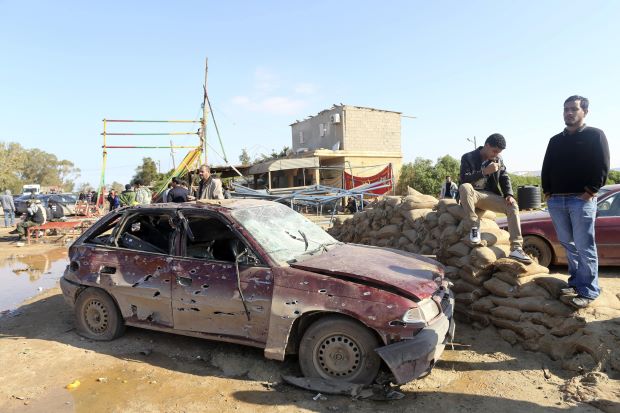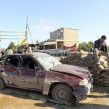
Ansar al-Shari’a: Transforming Libya into a Land of Jihad
Publication: Terrorism Monitor Volume: 12 Issue: 1
By:

In the first attack of its kind in Libya, a suicide car bomber drove an explosive-laden truck into a military checkpoint in Bersis (east of Benghazi) on December 22, 2013 that killed 13 people and injured 17 others (Jeune Afrique, December 23, 2013). The investigation team did not rule out the possibility that the bomb had been set off remotely. No group claimed responsibility for the attack, but Libyan officials interpreted the incident as an indication of the increasingly belligerent stance undertaken by local jihadist militias and Ansar al-Shari’a in particular (LANA News [Tripoli], December 22, 2013; Libya Herald, December 22, 2013, December 24, 2013).
Ansar al-Shari’a, which began in Benghazi as a revolutionary brigade in the 2011 anti-Qaddafi revolt, acquired popularity amongst extremists in September 2012 for its alleged role in the attack that killed U.S. Ambassador Christopher Stevens at the U.S. consulate in Benghazi. In October 2012, the organization changed its name to Ansar al-Sharia in Libya (ASL), likely in an attempt to stress its national ambitions, which came to fruition in the following months with a geographical expansion to Sirte, Derna and Ajdabiya (al-Ahram, [Cairo] November 26, 2013). Similar to other of the Arab world’s “Ansar al-Shari’a” movements, ASL has devoted much of its effort to da’wa (missionary activities) and trying to gain local support through the provision of social services, ranging from security patrols to garbage collection. ASL has also sought to insert itself into the local social fabric by establishing, amongst other things, a cultural center for women, a medical clinic and religious schools (Libya-Almostakbal, September 11, 2013). [1]
This da’wa effort, coupled with rhetoric largely focused on moral issues, has partially overshadowed ASL’s militant side, bolstering the perception that the group is more preoccupied with solidifying its presence in post-Qaddafi Libya than seeking an open confrontation with Libyan authorities. While its real agenda remains somewhat vague (besides the call for the application of Shari’a), several indications suggest that alongside its charitable efforts, ASL is also involved in shadowy activities aimed at assisting regional jihadists in using Libyan territory as a safe haven for militant training and the smuggling of weapons and fighters. With Libya serving as a central transit point for North African individuals seeking to reach the Syrian jihad, ASL is providing logistical assistance to would-be fighters with mobile training camps established around Benghazi and elsewhere in eastern Libyan (al-Arabiya, [Dubai] November 23, 2013; al-Watan, [Tripoli] November 27, 2013).
According to the accounts of Libyan officials, dozens of Tunisians and Algerians arrive every week in Benghazi to receive militant training, using fake Libyan passports to leave the country in a scheme facilitated by the presence of ASL operatives amongst the city airport’s personnel (Libya-Business News, December 16, 2013). While this sort of activity may fall within the kind of pan-Islamist solidarity shared by many Islamist actors, other evidence suggests that Libyan territory has become a fertile arena for regional jihadists to forge closer relationships and plan terrorist operations.
A case in point is that of Ayman Saadi, a young Tunisian arrested on October 30, 2013 in the Tunisian city of Monastir while trying to carry out a suicide mission (Kapitalis [Tunis] October 31, 2013). Saadi is said to have received training near Benghazi and Derna with the aim of fighting in Syria, but ended up being tasked by Libyan militants with a plot in his own country (Tunisie14, October 30, 2013; Tuniscope, November 3, 2013).
Although there is no evidence suggesting that Saadi was in direct contact with ASL in particular, the links between other regional groups and ASL appear to have been growing in recent months. Tunisian security officials have pointed to operational, financial and logistical links between ASL and Ansar al-Shari’a in Tunisia (AST), with the latter receiving weapons from its Libyan counterpart (Kapitalis, October 31, 2013; al-Watan, November 27, 2013). Those suspicions appeared well-grounded when news emerged about the recent arrest of AST leader Abu Iyadh in Misrata, although the reports were denied by Libyan officials (Tunisienumerique, December 30, 2013; December 31, 2013; LANA, December 31, 2013). Abu Iyadh’s presence in Libya, where he is said to have found shelter after AST was designated a terrorist organization by the Tunisian Government, was reported on at least one other occasion (Tunisienumerique, September 24, 2013). Algerian security sources claimed he attended a secret meeting hosted by ASL in Benghazi last September with representatives of AST, al-Qaeda in the Islamic Maghreb and various Moroccan and Egyptian jihadi militias. A new regional strategy aimed at intensifying the jihadi struggle both in Libya and in Tunisia was allegedly the topic of discussion (Africanmanager, December 15, 2013; Tunisie Focus, December 16, 2013).
On the domestic front, ASL has not yet been clearly implicated in the relentless wave of attacks in Benghazi and Derna that has killed more than 300 security officials in recent months. Assigning responsibility for such attacks is complicated by the presence of other jihadist and local militias operating in both cities in defiance of the central government (Jeune Afrique, January 1). However, the November 25 clashes in Benghazi between ASL and soldiers of the Saiqa Special Forces Brigade, which left 9 dead and 49 injured, proved that ASL has no restraint in resorting to armed violence against security forces when confronted (LANA News, November 26, 2013; see also Terrorism Monitor Brief, December 3, 2013).
New fighting erupted again near Benghazi on November 28, when ASL operatives attacked a Libyan Army unit escorting four militants arrested for possession of explosives, killing three soldiers and injuring three more (al-Watan, November 29, 2013). After the capture in Tripoli of Libyan militant Abu Anas al-Libi by U.S. Special Forces last October, ASL released a strong statement calling on its fellows to seek to release al-Libi “with every legitimate way allowed by the pure Shari’a,” [2] The statement further criticized the Libyan Government for being too friendly to foreign powers (Libya Herald, October 7, 2013). On November 12, only a few days after opening its Derna branch under the slogan, “A step toward the building of an Islamic State,” the group issued another communiqué stating that the only way to guarantee stability and security in Libya “was dependent on the application of the Shari’a” and accusing anyone working for the government of apostasy (AllAfrica.com, November 15). [3]
Although ASL involvement in recent episodes of violence against Libyan security forces might be a Benghazi-centred phenomenon facilitated by the group’s strong presence in the area and the city’s lawless environment, ASL’s belligerent progression in both words and deeds might suggest that regarding Libya as a land of jihad and not only dawa has become a concrete reality. Given the fluidity of Libya’s Islamist scene, where ASL is not alone in its calls for Shari’a and a number of Islamist militias continue to pose serious challenges to the country’s future, such a development is likely to worsen the security situation in Libya with potential consequences well beyond the country.
Ludovico Carlino is a Ph.D. Candidate in the Department of International Politics at the University of Reading, specializing in al-Qaeda and its affiliated movements.
Notes
1. Photos of ASL da’wa activities are regularly posted on the group’s official Twitter account, available at https://twitter.com/AnsarShariaa_ly.
2. The statement is available at www.tinyurl.com/nldktm4.
3. The statement is available at https://justpaste.it/dkpq.





